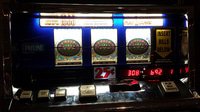Facts About Native American Gambling
 Most people would get curious about how huge the houses on Native American reservations are beside their payouts. Gambling online is one of the best ways to access your favourite games without leaving the comfort of your home. These include casino arcade games which require very little skill to win at. The most popular variants are puzzle, card, shooter, and sports arcade games. Our favourite site for everything about arcade games is fowlergameworld and here, you'll be able to find arcade casinos too where real money wins can be enjoyed. Here at Lakota Voice we have provided a quick recap of information on these casinos:
Most people would get curious about how huge the houses on Native American reservations are beside their payouts. Gambling online is one of the best ways to access your favourite games without leaving the comfort of your home. These include casino arcade games which require very little skill to win at. The most popular variants are puzzle, card, shooter, and sports arcade games. Our favourite site for everything about arcade games is fowlergameworld and here, you'll be able to find arcade casinos too where real money wins can be enjoyed. Here at Lakota Voice we have provided a quick recap of information on these casinos:
The Freedom of Reserves
In 1987, the Supreme Court ruled that since gambling wasn't prohibited throughout the state, then it had no right whatsoever to control gambling activities.
The Indian Gaming Regulatory Act of 1988 - acknowledged the tribe's potential to run casinos.
Birth of Native American Gambling
It all started when the Seminole Indians ignored local Florida regulations and ran a high staked bing operation. The authorities attempted to stop the gaming operations, however, it became an instant tourist attraction.
The state took them to court but the Supreme Court ruled in favor of the defendants in 1979.
What?! No Taxes?
The casinos don't pay state income taxes. However, the individuals who win and salaries paid out are still taxed.
They Generate More Revenue than Casinos In Other Reservations
Gambling business in Native American is lucrative as it generates more income than Las Vegas and Atlantic City combined! Annually, it raises up to $30 billion and has shown improvement. They also support economic and rural development within their area.
Creation of Jobs
The reservations' casinos have boosted employment and population which have increased by 26% and 11.5% respectively. Remember, the benefits for the Native American gambling is not only for natives but also people of other descents.
The Downsides
A research conducted, realized an increase in cases of violent crimes, suicide, bankruptcy, substance abuse, and theft in areas within a certain casino range.
Not all of the tribe have casino licenses
Only a third have casino licenses out of all the over 550 Native Indian tribes. Approximately 150 tribes are still awaiting their licenses' approval, today.
Profits are for Infrastructure and Social Development
Unlike the belief that all tribes-people are plush, they actually use their profits to invest in better roads and social places like schools.
Their Games Are Not Controlled
In comparison to the Las Vegas casinos, every casino can set their own payment schedules and displaying the payout percentages don't have clear rules.
Generally, however, table games appear to be more generous as compared to the slots which are tighter.
